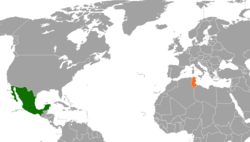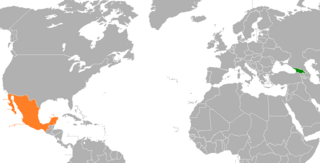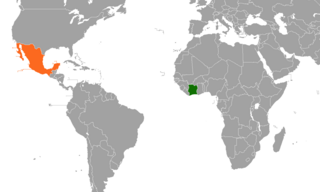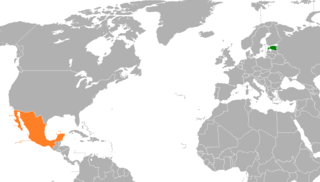 | |
Mexico | Tunisia |
|---|---|
The nations of Mexico and Tunisia established diplomatic relations in 1961. [1] Both nations are members of the United Nations.
 | |
Mexico | Tunisia |
|---|---|
The nations of Mexico and Tunisia established diplomatic relations in 1961. [1] Both nations are members of the United Nations.
In 1881, the Mexican government first heard of Tunisia when it received information sent by its diplomatic legation's in France and Italy about the French protectorate of Tunisia. [2] In 1956, Tunisia obtained its independence from France.
In 1961, Mexican President Adolfo López Mateos sent a presidential delegation of goodwill, led by Special Envoy Alejandro Carrillo Marcor and Delegate José Ezequiel Iturriaga; to visit Tunisia to pave the way for establishing diplomatic relations between the two nations. [3] That same year, on 17 November 1961, Mexico and Tunisia established diplomatic relations with Mexico accrediting its embassy in Paris for Tunisia. [1] Since the establishment of diplomatic relations; diplomatic relations between both nations have been limited and have taken place primarily in multinational organizations such as at the United Nations.
In 1994, Mexican Foreign Undersecretary Juan Rebolledo Gout paid a visit to Tunisia. [1] In March 2002, Tunisian Prime Minister Mohamed Ghannouchi paid a visit to Mexico to attend the Monterrey Consensus and met with Mexican President Vicente Fox. [4] In February 2005, Mexican Director General for Africa and Middle East, Hector Valezzi, paid a visit to Tunisia. In 2012, Mexican Director General for Africa and Middle East, Sara Valdés, paid a visit to Tunis to meet with the head of the African Development Bank (which was based in Tunisia at the time). [5] In November 2014, the Mexican Director General for ProMéxico, Francisco González Díaz, arrived to Tunisia leading a delegation of Mexican business people specializing in the food, building materials and biotechnology industries and consulting services. [6]
In March 2015, Mexico condemned the attack on the Bardo National Museum in Tunis where eight Mexican citizens happened to be at the time. The eight Mexican nationals were released from the museum and none of them were harmed during the attack. [7]
In November 2021, both nations celebrated 60 years of diplomatic relations. [8]
High-level visits from Mexico to Tunisia [3] [1] < [5] ref name=ProMéxico />
High-level visits from Tunisia to Mexico [4]
Both nations have signed several bilateral agreements such as an Agreement for Educational and Cultural Cooperation (1998); Agreement for Cooperation between Bancomext and the Tunisian Center of Export and Promotion (1998); Visa Suppression Agreement (1999); Memorandum of Understanding between ProMéxico and the Agency for the Promotion of Foreign Investment of Tunisia (2016) and a Memorandum of Understanding between the National Auto Parts Industry of Mexico (INA) and the Tunisian Automotive Association (2017). [4]
In 2023, trade between both nations totaled US$130 million. [9] Mexico's main exports to Tunisia include: telephones and mobile phones, machinery, sewing machines, chemical based products, rubber and plastic, motor cars and other vehicles, ferroalloys, pepper and vegetables. Tunisia's main exports to Mexico include: electrical equipment, telephones and mobile phones, hydraulic cement, olive oil, clothing, instruments and apparatuses, chemical based products, parts and accessories for motor vehicles, and fruits. [9] Mexican multinational company Grupo Bimbo operates in Tunisia. [10]

Former President Zine El Abidine Ben Ali has maintained Tunisia's long-time policy of seeking good relations with the West, while playing an active role in Arab and African regional bodies. President Habib Bourguiba took a nonaligned stance but emphasized close relations with Europe, Pakistan, and the United States.

The nations of Mexico and South Africa established diplomatic relations in 1993. Bilateral relations between both nations have been characterized by a good level of political dialogue and by the mutual recognition of the leadership and involvement exercised by both countries in their respective regions.

The nations of the Czech Republic and Mexico established diplomatic relations 1993. Relations between both nations existed beginning in 1922 when the Czech Republic was part of Czechoslovakia until its separation from the union in 1992.

Mexico and Morocco established diplomatic relations in 1962. Both nations are members of the Group of 24 and the United Nations.

The nations of Angola and Mexico established diplomatic relations in 1976. Both nations are members of the United Nations.

The nations of Mexico and Nigeria established diplomatic relations in 1976 and are two regional power nations in Latin America and Africa, respectively. Both nations are members of the Group of 15, Group of 24 and the United Nations.

The nations of Georgia and Mexico established diplomatic relations in 1992. Both nations are members of the United Nations and the World Trade Organization.

The nations of the Ivory Coast and Mexico established diplomatic relations in 1975. Both nations are members of the Group of 24 and the United Nations.

The nations of Mexico and Senegal established diplomatic relations in 1962. Both nations are members of the Group of 15 and the United Nations.

The nations of Estonia and Mexico initially established diplomatic relations in 1937, however, relations were broken after the annexation of Estonia by the USSR in 1944. Diplomatic relations were re-established in 1991. Both nations are members of the Organisation for Economic Co-operation and Development and the United Nations.

The nations of Mexico and Slovakia established diplomatic relations in 1993. Relations between both nations existed beginning in 1922 when Slovakia was part of Czechoslovakia until its separation from the union in 1992.

The nations of Ghana and Mexico established diplomatic relations in 1961. Both nations are members of the United Nations.

The nations of Mexico and Mongolia established diplomatic relations in 1975. Both nations are members of the Forum of East Asia–Latin America Cooperation and the United Nations.

The nations of Equatorial Guinea and Mexico established diplomatic relations in 1975. Both nations are members of the Association of Academies of the Spanish Language, Organization of Ibero-American States and the United Nations.

The nations of Libya and Mexico established diplomatic relations in 1975. Both nations are members of the United Nations.

The nations of Mexico and Saint Kitts and Nevis established diplomatic relations in 1990. Both nations are members of the Association of Caribbean States, Community of Latin American and Caribbean States, Organization of American States and the United Nations.

The nations of Mexico and Mozambique established diplomatic relations in 1988. Both nations are members of the United Nations.

The nations of Mexico and Syria established diplomatic relations in 1950. Both nations are founding members of the United Nations.

The nations of Cyprus and Mexico established diplomatic relations in 1974. Both nations are members of the United Nations.

The nations of Latvia and Mexico established diplomatic relations in 1991. Both nations are members of the Organisation for Economic Co-operation and Development and the United Nations.